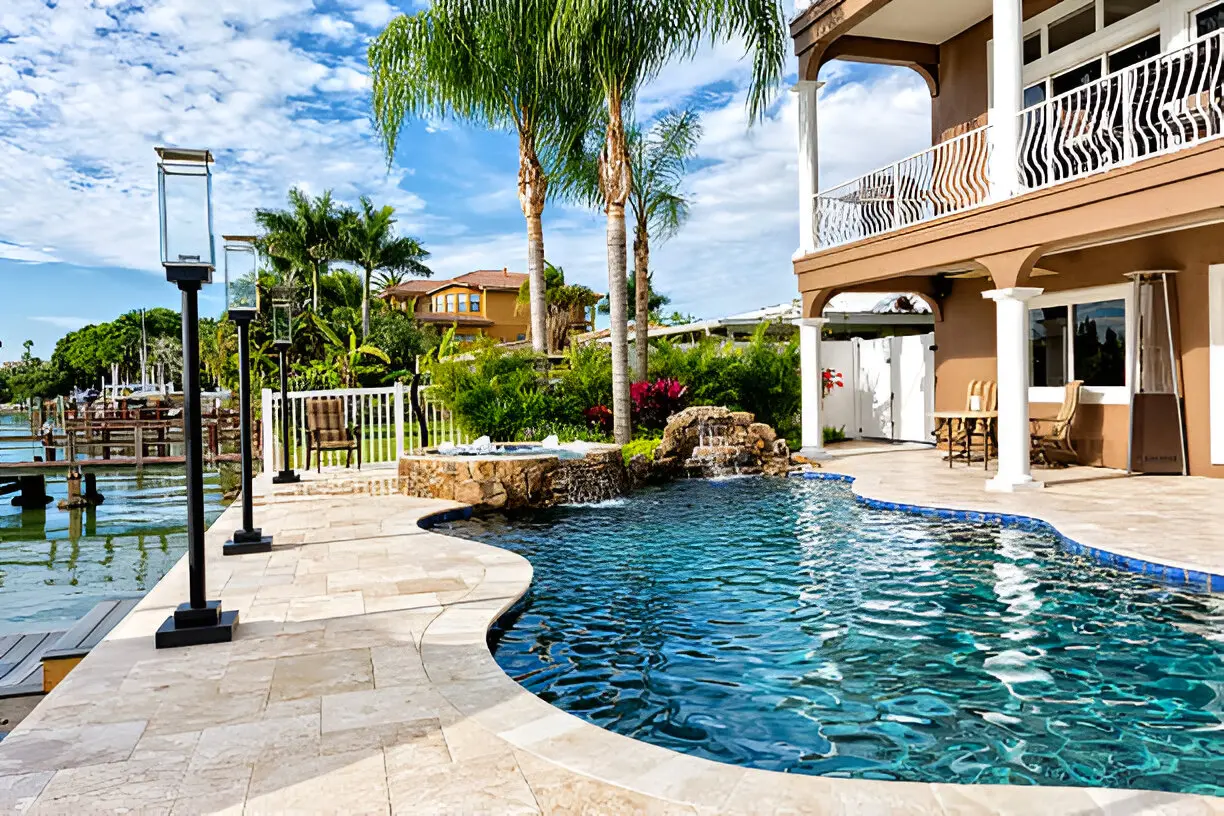How Florida Homeowners Maintain Their Residential Pools
Owning a pool in Florida is a year-round privilege, but it also comes with an ongoing list of maintenance tasks. The state’s climate is perfect for swimming, yet those same warm temperatures, frequent rains, and intense sunlight put added stress on pool systems. For many homeowners, proper pool care isn’t just about keeping the water blue—it’s about protecting a major investment and ensuring a safe, enjoyable environment for family and friends.
Maintaining a residential pool in Florida involves regular cleaning, chemical balancing, equipment upkeep, and periodic inspections. Each of these areas plays a role in keeping the pool functioning efficiently and looking its best.
Staying on Top of Cleaning
Debris is a constant challenge in Florida pools, thanks to year-round plant growth and seasonal storms. Leaves, pollen, insects, and even fine sand can quickly build up on the water’s surface and in the pool’s filtration system. Skimming the pool daily is a basic first step, but vacuuming and brushing the pool walls and floor are equally important.
Many Florida homeowners use automatic pool cleaners to handle the bulk of the work, especially in larger pools or those surrounded by landscaping. However, even with automation, manual checks are essential to ensure problem areas—like steps, corners, and along the waterline—are kept clean. Regular cleaning helps prevent algae blooms, stains, and the buildup of oils or residue that can cloud the water.
Managing Water Chemistry
Florida’s hot, humid climate makes water chemistry maintenance a high priority. The combination of heat and heavy use can cause chlorine levels to drop quickly, which creates an opportunity for algae and bacteria to grow. At the same time, frequent rainfall can dilute pool chemicals, throwing off pH and alkalinity balance.
Most homeowners test their pool water at least twice a week during the summer months, adjusting chlorine, pH, and alkalinity levels as needed. Stabilizers, like cyanuric acid, are often used to help chlorine last longer under Florida’s intense sun. Calcium hardness is another important measurement, as water that’s too soft can damage plaster and tile, while water that’s too hard can leave scale deposits.
Regular chemical balancing not only keeps the water safe for swimmers but also helps protect the pool’s surfaces and equipment from damage.
Maintaining Pool Equipment
Behind every well-functioning Florida pool is a reliable set of equipment. The pump, filter, and heater (if applicable) all work together to keep water clean and comfortable. Pumps typically run for several hours a day, circulating water through the filter to remove debris and distribute chemicals evenly.
Filters—whether cartridge, sand, or diatomaceous earth—need routine cleaning or backwashing to keep them operating efficiently. Clogged filters reduce water flow and can strain the pump, leading to higher energy costs and potential breakdowns.
Other equipment, like skimmer baskets, return jets, and pool lights, should be checked regularly to ensure they’re in good condition. Many homeowners schedule annual professional inspections to catch potential issues before they lead to costly repairs.
Controlling Algae Growth
Florida’s warm climate creates ideal conditions for algae growth, which can turn pool water green or cloudy in a matter of days if left unchecked. Preventing algae is easier than treating an outbreak, so consistent chlorine levels, brushing the walls, and running the pump long enough each day are key.
Shock treatments—adding a large dose of chlorine or other sanitizing chemicals—are often used after heavy rain, high pool usage, or when algae first appears. Phosphate removers can also help, as phosphates act as a food source for algae.
Protecting Against the Weather
Florida homeowners also have to account for the weather when maintaining their pools. During the rainy season, extra filtration and chemical adjustments are often needed to keep the water balanced. Storms can introduce debris and contaminants into the pool, requiring thorough cleaning and sometimes multiple rounds of chemical treatment.
Hurricane season poses additional challenges. Many pool owners lower their water level slightly before a storm to account for heavy rain, secure or remove loose equipment, and ensure that pumps and filters are protected from flooding. After a storm passes, pools often need extensive cleaning and rebalancing.
The Role of Leak Detection in Pool Care
One of the most overlooked yet critical parts of pool maintenance in Florida is leak detection. Because of the state’s high evaporation rates, homeowners sometimes assume water loss is normal. While some evaporation is expected—especially in summer—significant water loss may point to a leak.
A leaking pool can waste thousands of gallons of water each year, driving up utility bills and throwing off chemical balance. More importantly, leaks can cause long-term structural damage. Escaping water can erode the soil under and around the pool, potentially cracking the shell, destabilizing the deck, or even affecting nearby structures.
Detecting a leak early can save homeowners from expensive repairs. Professional leak detection services use specialized tools like electronic listening devices, dye testing, and pressure checks to pinpoint the exact location of a leak without unnecessary disruption. Whether it’s a failing seal, a cracked pipe, or damage to the pool shell, repairs are far less costly when addressed promptly.
Including leak detection as part of an annual maintenance routine is a smart move for Florida pool owners. Regular checks ensure that minor problems are found before they grow into major headaches, keeping the pool safe, efficient, and structurally sound.
Seasonal Maintenance Strategies
Although Florida’s climate allows for year-round swimming, there are seasonal adjustments that can make pool care easier.
In the cooler months, when pool use may slow down, many homeowners reduce pump run times and adjust chemical dosages accordingly. This period is a good opportunity for deep cleaning, resurfacing, or other major maintenance projects that are easier to complete when the pool isn’t in heavy use.
As spring approaches, preparing for the busy swimming season means checking equipment thoroughly, cleaning filters, and stocking up on necessary chemicals. Scheduling a professional inspection—including leak detection—before summer can help prevent mid-season surprises.
Professional Help vs. DIY Maintenance
Some Florida homeowners choose to handle all their pool care themselves, while others rely on professional pool service companies. The right approach depends on budget, time availability, and comfort with testing and adjusting water chemistry.
Professional services often include weekly cleaning, water testing, chemical adjustments, and equipment inspections. They also have the tools and experience to spot problems early, including signs of leaks. For busy homeowners, hiring a service can save time and ensure the pool stays in top condition.
DIY maintenance can be more economical, but it requires diligence. Even experienced pool owners sometimes call in professionals for specialized tasks like leak detection, pump repair, or major cleanings after storms.
Keeping Safety in Mind
Beyond water clarity and chemistry, safety is a major part of pool maintenance. Florida’s pool safety laws require certain protective measures, such as fencing, alarms, or safety covers, to prevent accidents.
Homeowners should also regularly check ladders, handrails, and diving boards for secure installation and good condition. Clear, balanced water not only looks appealing but also makes it easier to see the bottom of the pool, adding another layer of safety.
The Value of Consistency
In Florida, a pool that’s neglected for even a few weeks can develop multiple problems, from algae growth to equipment damage. Consistency is key—whether that means setting aside time each week for cleaning and testing or hiring a professional service to handle the work.
Regular maintenance keeps the water safe, extends the life of the pool’s surfaces and equipment, and ensures the pool remains an asset to the property. With the right care, a Florida pool can be enjoyed year-round without becoming a source of stress or unexpected expense.
For homeowners, the goal is simple: protect the investment, keep the water inviting, and avoid costly repairs. By staying on top of cleaning, water chemistry, equipment care, and—most importantly—pool leak detection, Floridians can enjoy their backyard oasis for many years to come.
Also Read- How to Keep a Busy Lifestyle Without Sacrificing a Clean Home

